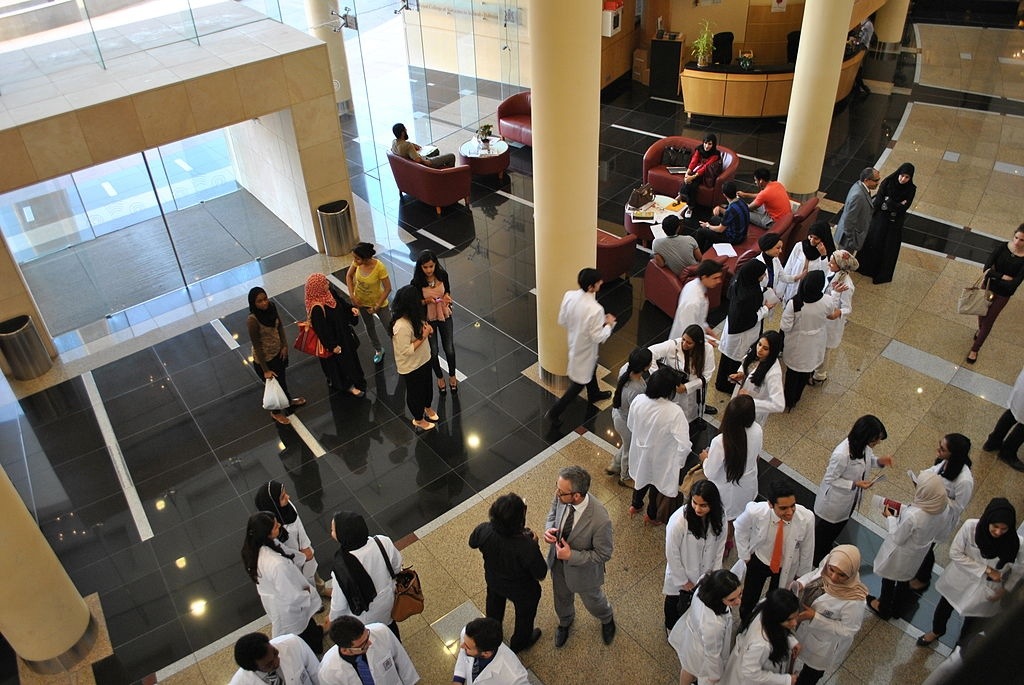Deputy News Editor
The influence of the Bahrain’s ruling Al-Khalifa dynasty reaches “all the way up to Stephen’s Green, the RCSI and the HSE,” a consultant with the Mater Private Hospital has claimed. Dr Damian McCormack made the comment at a discussion about the persecution of medical professionals in Bahrain held last Wednesday by the Society for International Affairs (SoFIA). Speaking to students, he called Bahrain an “outrageous black spot for human rights”, run by people “who have dinner with my colleagues”. He condemned the decision of RCSI’s Bahrain branch to force its students swear an oath of loyalty to the king and to sign a non-protest pledge. He also criticised the secrecy surrounding the salary paid to the RCSI’s CEO. Maurice Manning, the chancellor of NUI, he told the audience, flew to Bahrain “courtesy of the RCSI”.
McCormack, who was part of an Irish delegation to Bahrain in 2011 with Senators Averil Power and Marian Harkin, went on to claim that the RCSI’s mature entry policy was marked by “nepotism”, in which applicants who “happen to be special” are admitted. He said that RCSI allows students who don’t have the right “skill-set” to “buy their way into medicine”. Some students don’t speak English or haven’t completed the Leaving Cert, he claimed.
“O’Grady called on Trinity’s Students’ Union to set up a “friends of Bahrain” society and show solidarity with the 400 students who had their scholarships rescinded by the Bahraini government in the previous week.”
McCormack said that the events in Bahrain had politicised him. He said he learnt that the United Nations is “about money” after the Bahraini government got a place for their own official on a UN human rights council after presenting a “large cheque” to the council. He also described the links between Irish business and Bahrain, mentioning Aer Rianta’s control of Bahrain Airport’s duty free and the ESB’s investments in the country’s electricity sector.
Dr Fatima Haji, a former tutor with RCSI Bahrain who was tortured and sexually abused in prison after being among 30 nurses and doctors arrested in 2011 for treating protesters in Bahrain, also criticised RCSI for its involvement in the country. She said the college “denied her existence” in The Irish Times and told the paper she had “bad qualifications”. RCSI later backtracked, she said, claiming they would “stand by” her should she continue to be in jail or be re-arrested. The five year sentence given to her by a military court was later overturned by a civilian court.
Human rights activist Tara O’Grady described how a study carried out by Professor David Grayson, the head of Trinity’s School of Chemistry on CS gas canisters brought back from Bahrain revealed the gas was ten times stronger than normal. She said the regime was firing tear gas canisters at head height and described how the gas can cause fatalities in children, the elderly and the infirm and induce the spontaneous abortion of foetuses. She said the protests remain largely peaceful and non-sectarian, but claimed that the Sunni dominated government was pursuing a sectarian policy towards Shia Muslims, citing the recent arrest of Shia political leaders.
O’Grady praised the pro-active role taken by Irish nurses’ and teachers’ unions in support of their colleagues in Bahrain, and contrasted their stance with the inaction of the Irish Medical Association representing doctors and the employers’ organisation IBEC. She called on Trinity’s Students’ Union to set up a “friends of Bahrain” society and show solidarity with the 400 students who had their scholarships rescinded by the Bahraini government in the previous week.
Andrew Anderson of the human-rights organisation Frontline Defenders called the arrest, torture and “show trial” of 50 medics in Bahrain unprecedented “in all of the history of the world”. He reproached Taoiseach Enda Kenny and Richard Bruton for praising Saudi Arabia’s human rights record as “moderate leadership” in the region during their recent trade mission, since Saudi forces have taken part in the suppression of protests in Bahrain.
In 2000, the British government had, he alleged, “tipped off” the police officer Ian Henderson, who was accused of involvement in the torture of pro-democracy protesters while he was head of security in Bahrain, allowing him to flee to Bahrain and escape arrest in Britain. Another British police officer, John Yates, recently gone to Bahrain as an advisor had failed to eliminate the use of torture, Anderson added.
Anderson said media coverage of Bahrain is “absent” compared to the coverage of Syria. Tara O’Grady denounced the BBC for its “pathetic” coverage and for its “subservience to the UK government’s connections in Saudi Arabia”, while Dr Damian McCormack pointed out the Bahraini governments large expenditure on PR and use of agents to follow activists.
McCormack concluded the panel by asserting that human rights abuses are carried out with the “blessing of middle earth and middle society”, alluding to ownership by the Irish firm CRH of the company that built the wall in Palestine. He argued that only 10 per cent of the population of a country “can’t be bought” by the government, while four or five per cent is made up of “sociopaths” including bank managers and CEOs.






